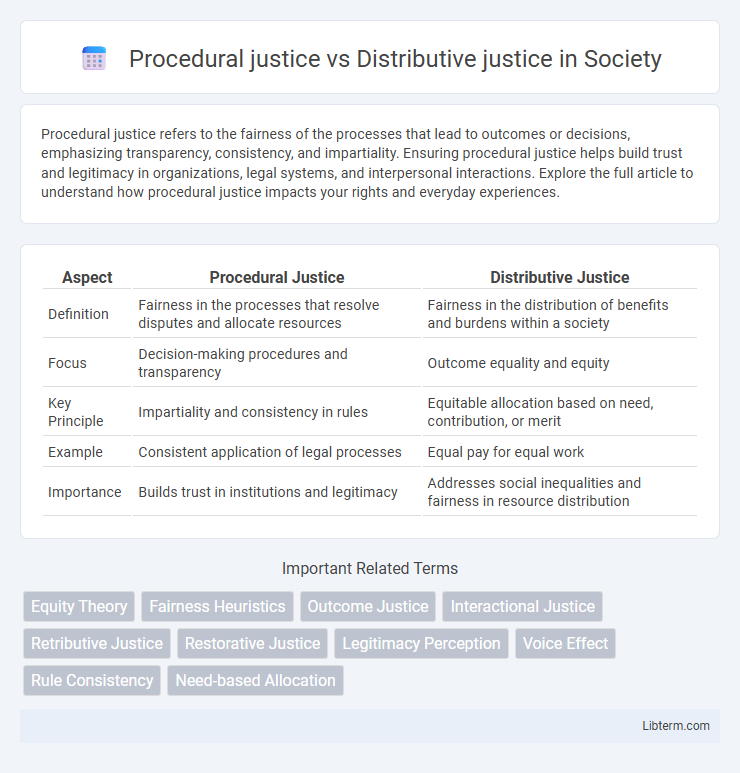Procedural justice refers to the fairness of the processes that lead to outcomes or decisions, emphasizing transparency, consistency, and impartiality. Ensuring procedural justice helps build trust and legitimacy in organizations, legal systems, and interpersonal interactions. Explore the full article to understand how procedural justice impacts your rights and everyday experiences.
Table of Comparison
| Aspect | Procedural Justice | Distributive Justice |
|---|---|---|
| Definition | Fairness in the processes that resolve disputes and allocate resources | Fairness in the distribution of benefits and burdens within a society |
| Focus | Decision-making procedures and transparency | Outcome equality and equity |
| Key Principle | Impartiality and consistency in rules | Equitable allocation based on need, contribution, or merit |
| Example | Consistent application of legal processes | Equal pay for equal work |
| Importance | Builds trust in institutions and legitimacy | Addresses social inequalities and fairness in resource distribution |
Introduction to Procedural and Distributive Justice
Procedural justice refers to the fairness and transparency of the processes used to make decisions, ensuring all parties have a voice and that rules are consistently applied. Distributive justice focuses on the equitable allocation of resources, benefits, and burdens according to established criteria like equality, equity, or need. Understanding the distinction between procedural and distributive justice is essential for addressing perceptions of fairness in organizational settings and social institutions.
Defining Procedural Justice
Procedural justice refers to the fairness of the processes and methods used to make decisions, emphasizing transparency, consistency, and the opportunity for all parties to voice their concerns. It ensures that the procedures behind resource allocation or rule enforcement are impartial and unbiased, regardless of the outcome. This concept contrasts with distributive justice, which focuses on the perceived fairness of the actual distribution of resources or outcomes.
Defining Distributive Justice
Distributive justice refers to the perceived fairness in the allocation of resources, rewards, and burdens among individuals or groups within a society or organization. It emphasizes equitable distribution based on criteria such as need, contribution, or equality, ensuring that outcomes align with accepted norms of fairness. This concept is critical in shaping attitudes toward justice in economic, social, and organizational contexts.
Key Differences Between Procedural and Distributive Justice
Procedural justice emphasizes the fairness of the processes and methods used to make decisions, ensuring transparency, consistency, and impartiality in decision-making. Distributive justice focuses on the equitable allocation of resources and outcomes based on criteria such as need, effort, or contribution. Key differences include procedural justice concerning the fairness of decision procedures, while distributive justice centers on the fairness of result distribution.
Historical Perspectives on Justice Theories
Historical perspectives on justice theories reveal that procedural justice emphasizes fairness in the processes and methods used to allocate resources or resolve disputes, rooted in the works of John Rawls and legal theorists advocating due process. Distributive justice concerns the equitable allocation of resources and benefits among individuals, with origins tracing back to Aristotle's concept of distributive fairness and further developed through Marxist and utilitarian frameworks. The evolution of justice theories highlights a dynamic interplay between ensuring fair procedures and achieving just outcomes within societal structures.
Importance of Fair Processes vs. Fair Outcomes
Procedural justice emphasizes the importance of fair processes in decision-making, ensuring transparency, consistency, and impartiality to foster trust and legitimacy among stakeholders. Distributive justice focuses on the equitable allocation of resources and outcomes based on fairness criteria such as need, equality, or equity. Balancing fair processes with fair outcomes is crucial for maintaining organizational harmony and enhancing perceptions of justice in social and legal contexts.
Applications in Legal and Organizational Contexts
Procedural justice emphasizes fairness in the processes that lead to outcomes, ensuring transparency and impartiality in both legal proceedings and organizational decision-making. Distributive justice focuses on the equitable allocation of resources or outcomes, influencing compensation structures, legal settlements, and organizational rewards. In legal contexts, procedural justice affects public trust and compliance, while distributive justice shapes perceptions of fairness in verdicts and penalties; in organizations, procedural justice fosters employee engagement, whereas distributive justice impacts job satisfaction and retention.
Psychological Impact of Justice Perceptions
Procedural justice emphasizes fairness in the methods and processes used to make decisions, significantly influencing individuals' trust and acceptance of outcomes. Distributive justice focuses on the perceived fairness of the outcome distribution, affecting feelings of satisfaction and equity among parties. Perceptions of procedural justice often predict organizational commitment and cooperation more strongly than distributive justice, highlighting its critical role in psychological well-being and motivation.
Contemporary Debates: Which Form of Justice Matters More?
Contemporary debates on procedural justice versus distributive justice focus on which form holds greater significance in achieving fairness and legitimacy within organizations and societies. Procedural justice emphasizes the fairness of processes and decision-making methods, while distributive justice prioritizes the equitable allocation of resources and outcomes. Research suggests that perceptions of procedural justice often have stronger impacts on trust, cooperation, and acceptance of decisions, even when distributive outcomes are unfavorable.
Integrating Procedural and Distributive Justice for Equity
Integrating procedural and distributive justice enhances equity by ensuring fair processes and equitable outcomes in decision-making frameworks. Procedural justice emphasizes transparency, consistency, and impartiality in the mechanisms that allocate resources or resolve disputes, while distributive justice addresses the fairness of the actual distribution of benefits and burdens. Combining these concepts fosters trust, legitimacy, and satisfaction among stakeholders by aligning fair procedures with just results.
Procedural justice Infographic

 libterm.com
libterm.com